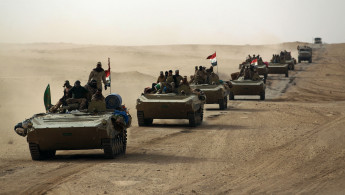Iraq launches military operation to secure desert near Syria border
The operation, dubbed "Will of Victory", began early on Sunday morning and would push to clear the remote territory between the provinces of Salahaddin, Nineveh and Anbar, a statement by the military said.
Iraqi armed forces, paramilitary units of the Shia-dominated Hashed al-Shaabi, tribal groups and US-led coalition warplanes were all taking part, according to the statement.
Iraq formally declared victory against the Islamic State group in late 2017, a few months after ousting the jihadists from their seat of power Mosul, the capital of Nineveh province.
The group lost their last sliver of territory in Syria - a small desert hamlet near the Iraqi border - in March.
But IS sleeper cells have managed to keep up hit-and-run attacks in desolate parts of Iraq, targeting government checkpoints, public infrastructure and local officials.
Iraq's security forces have targeted IS in several coalition-backed operations in recent months, including in the rugged Hamrin region north of Baghdad.
In May, they armed tribal forces in several dozen villages in Nineveh province to defend themselves against insurgent attacks.
It came as Iraq's Supreme Court said that more than 500 foreign nationals were tried and sentenced for joining the Islamic State group in 2018.
Around a thousand suspected foreign IS fighters are in detention in northeast Syria, in addition to around 9,000 foreign women and children in camps there.
Iraq has also already tried thousands of its own nationals arrested on home soil for joining IS, including women.
It has begun trial proceedings for nearly 900 Iraqis repatriated from Syria and sentenced a number of fighters under its counter-terrorism law.
Rights groups including Human Rights Watch have criticised the trials, which they say often rely on circumstantial evidence or confessions obtained under torture.
Iraq's government has declined to provide figures on detention centres or prisoners, including how many are facing terrorism-related charges, although some studies estimate 20,000 are being held for purported IS links.
Some facilities have shut down in recent years, including the Abu Ghraib complex that became infamous for prisoner abuse during the US-led occupation.
Others were rocked by riots and prison breaks that allowed detainees accused of "terrorism" to escape.
Now, with more repatriated fighters expected to arrive in the coming months, observers fear an already-strained system will be flooded.
"The prisons that are being used definitely are insufficient in capacity to hold potentially, thousands of extra people that will be transferred," warned Belkis Wille of Human Rights Watch.
HRW has called on the international community to help Iraq improve its judicial processes and revamp its jails - but Iraq, Wille said, may have something else in mind.
"The authorities are very conscious, and do not want something like Abu Ghraib or Bucca to happen again," she told AFP.
"It is a part of the reason why so many of the suspects are getting the death penalty or life (in) prison. I think the intention is that these people would not come out of prison, so you would not have the same dynamic."
Follow us on Twitter: @The_NewArab





 Follow the Middle East's top stories in English at The New Arab on Google News
Follow the Middle East's top stories in English at The New Arab on Google News
![Israeli forces ordered bombed Gaza's Jabalia, ordering residents to leave [Getty]](/sites/default/files/styles/image_330x185/public/2176418030.jpeg?h=a5f2f23a&itok=_YGZaP1z)

